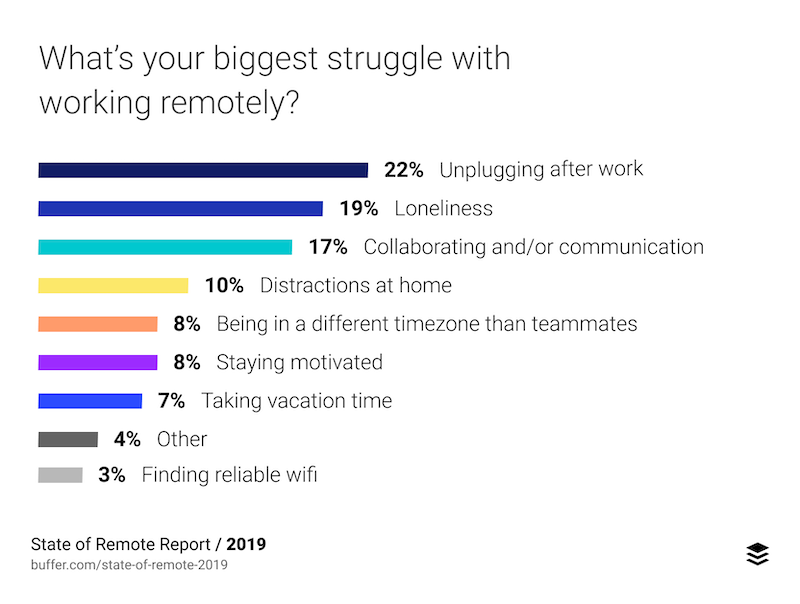Have you seen members of your remote team working late into the night or at weekends? Your tacit approval of this might be ruining your team's ability to perform at a high level over the long term[1]. It's important to project a culture where it's expected for people to maintain a healthy work-life balance. If people don't do that they become resentful, fatigued and risk occupational burnout. This post lists some tips to help remote team leaders boost productivity, without burning out team members working from home.
Occupational burnout symptoms
"Burn-out is a syndrome conceptualized as resulting from chronic workplace stress that has not been successfully managed. It is characterized by three dimensions:
- feelings of energy depletion or exhaustion;
- increased mental distance from one’s job, or feelings of negativism or cynicism related to one's job; and
- reduced professional efficacy.
Burn-out refers specifically to phenomena in the occupational context and should not be applied to describe experiences in other areas of life."
Source: https://www.who.int/mental_health/evidence/burn-out/en/
A recent survey found that the biggest challenge for remote teams is switching off after work. In my experience it's a problem people won't know they have. It'll creep up and team members will only notice when someone else draws their attention to it or when they burn out. It falls to the team leaders to bring awareness to the issue and promote healthy working habits. This will promote a healthy corporate culture, which is very important for remote teams.

Tips for to help your team work from home without burning out #
Do you find it tempting to passively or actively encourage team members to work around the clock? Sadly it's a short term gain at the expense of long term productivity. Here are some tips to share with your team members and help them unplug after work.
1. Dedicated space to work #
In an ideal world that isn't engulfed in a pandemic you could suggest that team members work from a co-working space. Some companies cover the cost of this.
Co-working isn't available to everyone though so you could suggest people work from a spare bedroom, or backyard shed.
Many people, in London for example, are working from their bedrooms, some from their beds. In theory this might sound great, but after a while the novelty wears off and it can become draining and even ergonomically harmful. If that's the case you could suggest they buy a fold away desk e.g. https://www.amazon.co.uk/Denny-Shop-Camping-Catering-Crystals®/dp/B07QH76VZH/ that can be stowed after work.
2. Issue work equipment / profiles #
If your company issues work laptops encourage team members to shut them when the day is done. Out of hours emergencies do come up, but those should be the exception (one every few months) not the rule.
If your company operates a "bring your own device" policy, require that team members create a user profile for work. That way they can contain personal browsing etc. to the personal account, without peeking into the work account to check emails.
3. Create an end of day ritual #
Rituals are a terrific way to signal the start or end of something to your mind. Help each member of your team create a ritual that signals the end of the work day. That could be putting away their work laptop, closing the door to their home office, or even turning their work phones to do not disturb mode.
It's worth saying that work phones should also be put away and wherever possible work email and chat should be kept off of personal phones.
4. Set an explicit work schedules #
Schedules help set availability expectations for the whole team. Clearly life events will crop up, but those deviations should be the exception. Team members should alert people to those exceptions e.g. I'm starting a bit earlier today because I've got to take my child to the doctor. That way they'll feel less inclined to need to keep an eye on their phones while they are in the doctor's office.
5. Get some fresh air #
Encourage your team members to get some fresh air. Getting out of the house, especially near some nature helps increase and find a tree to stare at for a bit to increase your sense of wellbeing.
6. Bonus tip #
The bonus tip is for you to set the example. Show that you switch off from work. With some gentle encouragement your team members will follow your example.
Footnotes
In some instances team members will work unusual hours e.g. if they have childcare commitments during the day. For the purposes of this post we will assume the expectation is that remote team members will work a standard 9-5 day. ↩︎